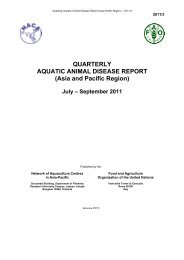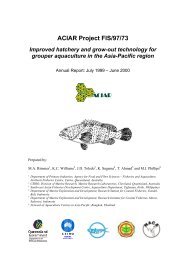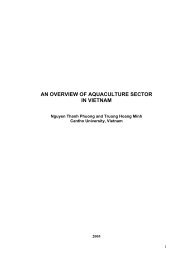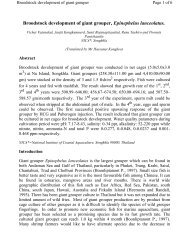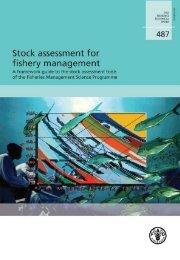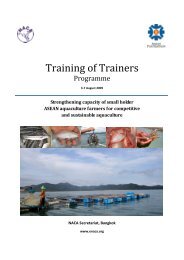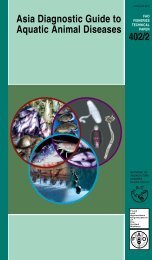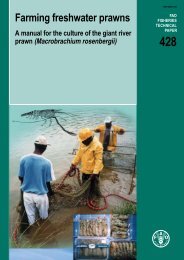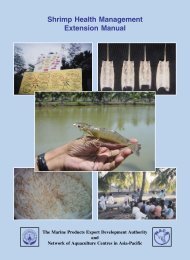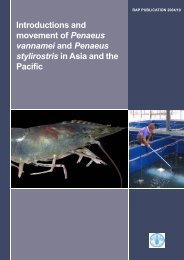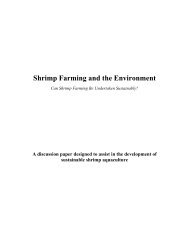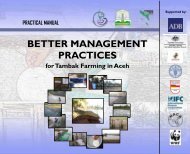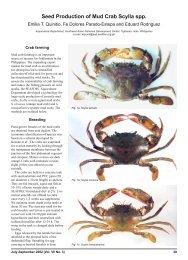State of World Fisheries and Aquaculture 2004 - Library
State of World Fisheries and Aquaculture 2004 - Library
State of World Fisheries and Aquaculture 2004 - Library
Create successful ePaper yourself
Turn your PDF publications into a flip-book with our unique Google optimized e-Paper software.
86<br />
The <strong>State</strong> <strong>of</strong> <strong>World</strong> <strong>Fisheries</strong> <strong>and</strong> <strong>Aquaculture</strong> <strong>2004</strong><br />
By fostering collaboration among international institutions <strong>and</strong> individual scientists,<br />
FAO expects that this programme will generate a peer-reviewed <strong>and</strong> multidisciplinary<br />
aquatic food safety <strong>and</strong> quality knowledge base. Its long-term goals are to support<br />
member countries in the areas <strong>of</strong> safety <strong>and</strong> quality (including authenticity) <strong>of</strong><br />
food produced from aquatic species. Under this programme, the use <strong>of</strong> information<br />
technologies will be maximized to facilitate information dissemination <strong>and</strong> to enhance<br />
capacity-building initiatives in developing countries.<br />
A list <strong>of</strong> common names linked to the Aquatic Food Programme knowledge base<br />
containing scientific data could be useful for preparing <strong>and</strong> implementing a new Codex<br />
inclusion procedure <strong>and</strong>, more generally, for further work on species identification <strong>and</strong><br />
for enhancing international fish trade transparency.<br />
Depleted stocks recovery: a challenging necessity<br />
THE ISSUE<br />
During the eighteenth <strong>and</strong> nineteenth century, thinkers such as Jean-Baptiste de<br />
Lamarck <strong>and</strong> Thomas Huxley assumed that the size <strong>of</strong> the oceans <strong>and</strong> the high<br />
fecundity <strong>of</strong> commercially exploited fish <strong>and</strong> shellfish meant that, under the conditions<br />
prevailing at that time, the risk <strong>of</strong> extinction <strong>of</strong> fishery resources was low. These<br />
scientists overestimated the ocean’s resilience to fishing <strong>and</strong> underestimated both the<br />
future dem<strong>and</strong> <strong>and</strong> the potential progress in fishing efficiency. However, the fact that<br />
local natural renewable resources could be depleted through wasteful competition<br />
<strong>and</strong> lack <strong>of</strong> ownership has been known literally for centuries, 42 <strong>and</strong> by the end <strong>of</strong> the<br />
1960s the “tragedy <strong>of</strong> the commons” was already common knowledge. 43 The problem<br />
<strong>of</strong> overfishing was already recognized by the first FAO <strong>Fisheries</strong> Technical Committee<br />
in 1946 <strong>and</strong> was flagged recurrently in the successive FAO fisheries conferences, for<br />
example in Vancouver (1973), Rome (1984) <strong>and</strong> Reykjavik (2002), to cite just a few<br />
major events. The depletion issue was flagged again at the start <strong>of</strong> the twenty-first<br />
century in The <strong>State</strong> <strong>of</strong> <strong>World</strong> <strong>Fisheries</strong> <strong>and</strong> <strong>Aquaculture</strong> 2002, which indicated that<br />
“An estimated 25 percent <strong>of</strong> the major marine fish stocks … are underexploited or<br />
moderately exploited … About 47 percent <strong>of</strong> the main stocks or species groups are<br />
fully exploited … 18 percent <strong>of</strong> stocks or species groups are reported as overexploited<br />
… The remaining 10 percent have become significantly depleted, or are recovering<br />
from depletion.” Among the stocks considered depleted, the Northeast Atlantic <strong>and</strong><br />
the Mediterranean <strong>and</strong> Black Seas are the areas with stocks having the greatest need<br />
for recovery, followed by the Northwest Atlantic, the Southeast Atlantic, the Southeast<br />
Pacific <strong>and</strong> the Southern Ocean areas.<br />
The depletion <strong>of</strong> stocks contravenes the basic conservation requirement <strong>of</strong> the<br />
1982 UN Convention on the Law <strong>of</strong> the Sea <strong>and</strong> <strong>of</strong> sustainable development. It is also<br />
contrary to the principles <strong>and</strong> management provisions adopted in the 1995 FAO Code<br />
<strong>of</strong> Conduct for Responsible <strong>Fisheries</strong>. It affects the structure, functioning <strong>and</strong> resilience<br />
<strong>of</strong> the ecosystem, threatens food security <strong>and</strong> economic development, <strong>and</strong> reduces<br />
long-term social welfare. The dem<strong>and</strong> for fish as human food may reach around<br />
180 million tonnes by 2030 <strong>and</strong> then neither aquaculture nor any terrestrial food<br />
production system could replace the protein production <strong>of</strong> the wild marine ecosystems.<br />
The Plan <strong>of</strong> Implementation <strong>of</strong> the <strong>World</strong> Summit on Sustainable Development<br />
specifically urges the need to “Maintain or restore stocks to levels that can produce the<br />
maximum sustainable yield with the aim <strong>of</strong> achieving these goals for depleted stocks<br />
on an urgent basis <strong>and</strong> where possible not later than 2015.” Considering the trends<br />
since 1946, this time-frame certainly represents a high-order challenge.<br />
42<br />
S.M. Garcia <strong>and</strong> J. Boncoeur. <strong>2004</strong>. Allocation <strong>and</strong> conservation <strong>of</strong> ocean fishery resources: connecting rights <strong>and</strong> responsibilities.<br />
Paper presented at the 4th <strong>World</strong> <strong>Fisheries</strong> Congress, Vancouver, Canada, May <strong>2004</strong>, as an opening to the session on Allocation <strong>and</strong><br />
Conservation.<br />
43<br />
G. Hardin. 1968. The tragedy <strong>of</strong> the commons. Science, 162: 1243–1248.



